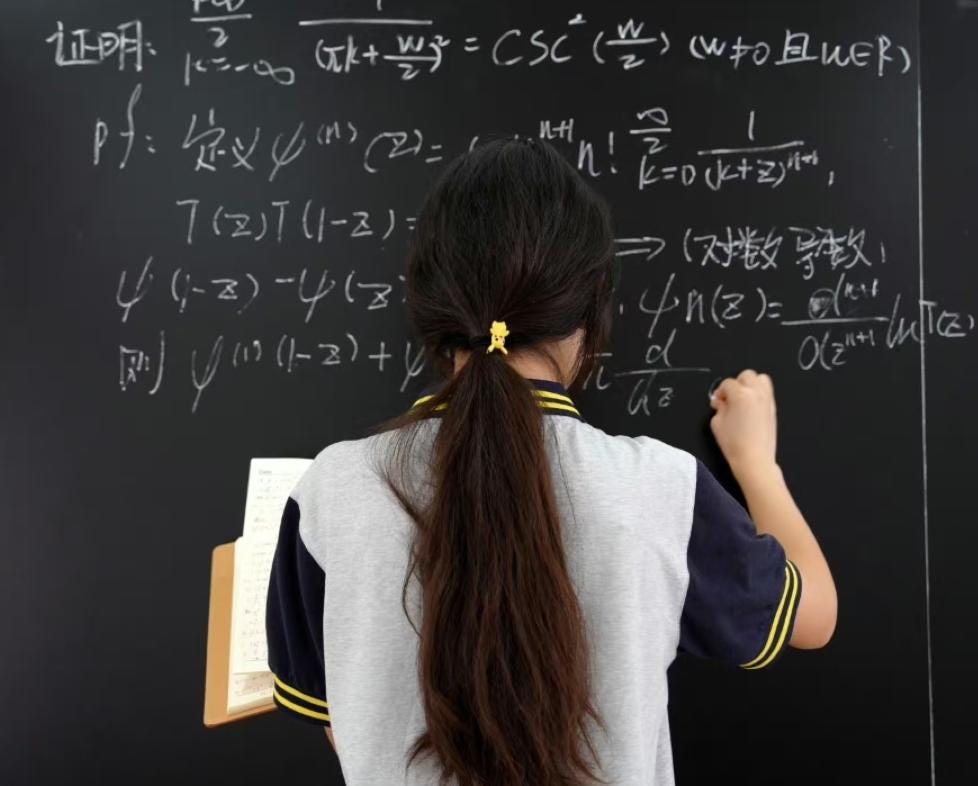17-Year-Old Technical school Girl Breaks into Top Competition, Shocks All of China
Jiang Ping's Achievement Sparks Debate on Educational Equity in China
Jiang Ping, a 17-year-old student from a vocational school, has become a national phenomenon in China after securing 12th place in the Alibaba Global Mathematics Competition. Her achievement, surpassing students from prestigious institutions like Tsinghua, Peking University, Cambridge, and MIT, has been widely reported by major media outlets including CCTV. This remarkable feat has sparked a nationwide discussion about the education system and how it supports students with unique talents. Jiang’s self-taught proficiency in mathematics, reaching undergraduate levels, and her success without professional guidance have highlighted the need for educational reform that nurtures exceptional abilities beyond traditional academic paths.
Her story has captivated millions, trending on social media and inspiring both admiration and reflection on the potential of specialized education. The local community, including village committees and residents, have shown immense pride and support, further emphasizing the role of communal encouragement in fostering young talent. Jiang Ping's interests in mathematics and fashion design have attracted offers from several top universities, with Zhejiang University being her preferred choice. Her journey underscores the importance of a versatile educational approach that accommodates diverse talents and aspirations.
Jiang Ping's Achievement Sparks Debate on Educational Equity in China
Jiang Ping, through her hard work and talent, successfully entered the finals of the 2024 Alibaba Global Mathematics Competition (referred to as "AliMath") and achieved an impressive score of 93, securing 12th place globally. This highlights that academic qualifications are not the sole measure of ability, challenging traditional perceptions of the relationship between education and capability.
Diplomas do not equate to skill levels, nor do degrees define abilities. Despite attending a vocational school, Jiang Ping's passion for mathematics led her to master partial differential equations through two years of self-study. This demonstrates that academic qualifications are merely one way to acquire knowledge and should not be blindly idolized by society.
Why does such a mathematically gifted girl face the issue of "position not matching virtue"? This underscores flaws in the talent selection system. The rigid educational framework emphasizes "high scores only," and the selection mechanism of middle school entrance exams is particularly unfair to students with specialized talents. The educational philosophy of "teaching according to ability" has gradually strayed from its original intent due to the distorted pursuit of scores. The current educational system urgently needs reform to balance breadth and depth in learning, foster innovation, and develop critical thinking rather than standardizing students.
The surprise at a vocational school girl winning 12th place in a math competition reflects the prevalent degree bias in today's society. In general perception, higher education is ranked as university > high school > vocational school. Society's overemphasis on academic qualifications has led to biases against vocational education. This prejudice affects the social status and development space of vocational education and limits students' opportunities to choose education paths based on their interests and strengths.
Jiang Ping's outstanding performance in the global math competition challenges the stereotype of vocational students' abilities. This event highlights the issue of educational resource equity. Often, educational resources are unevenly distributed, and some schools cannot access quality resources due to economic or demographic factors. This not only affects students' learning outcomes and growth but also exacerbates degree discrimination. Society should promote fair distribution of educational resources to provide equal learning opportunities for every student.
We should abandon the excessive worship and discrimination of academic qualifications, rationally view the relationship between education and ability, and respect everyone's choices and efforts. Talent should be evaluated based on actual ability and contributions, not merely on academic degrees. Enterprises and society should establish more scientific and comprehensive talent evaluation systems, focusing on practical skills, work experience, and professional qualities. Only then can we fairly and objectively assess talent, giving more people the recognition and opportunities they deserve.





